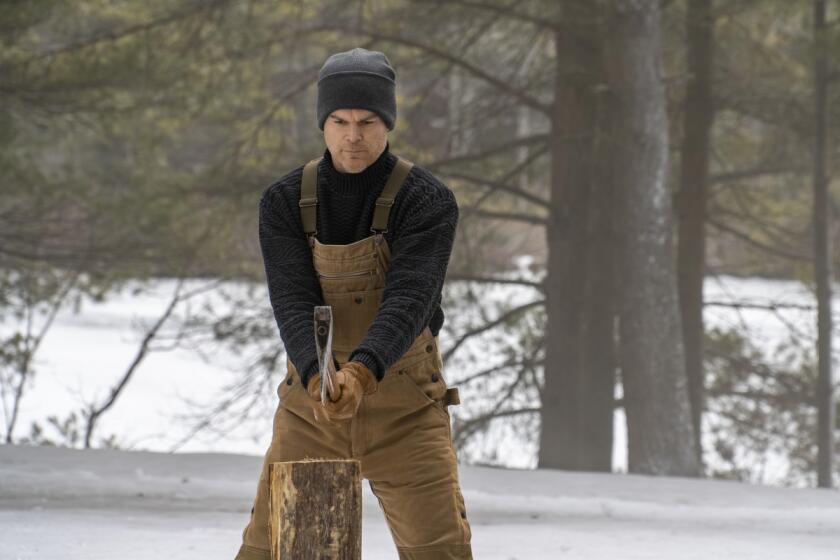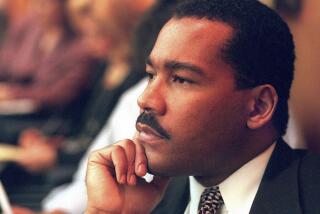Michael C. Hall breaks down ‘Dexter’s’ finale do-over: ‘Be careful what you wish for’
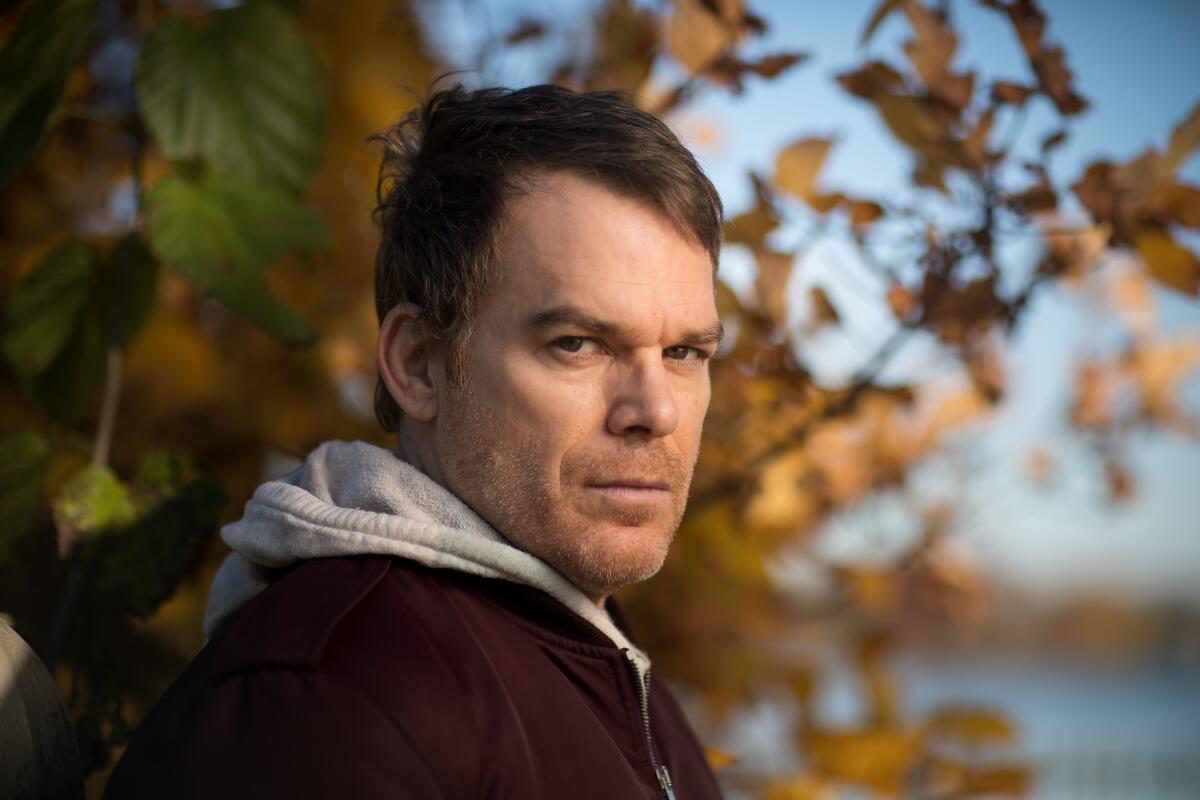
- Share via
The following contains major spoilers from the finale of “Dexter: New Blood.”
When the curtain came down in 2013 on Showtime’s “Dexter,” reaction was swift and heated. Legions of fans hooked on the drama about blood-spatter analyst/serial killer Dexter Morgan blasted the finale as a bewildering, open-ended misfire. That grumbling continued for years, calmed only by the launch of “Dexter: New Blood” in November.
Michael C. Hall, who plays Morgan, predicts that the finale for “Dexter: New Blood” will spark a similarly strong response. The episode not only brings a definitive close to Morgan’s vigilante campaign — it also depicts the end of Dexter Morgan.
“Some people will have predicted it, and some will be shocked by it,” the actor said in a Zoom interview last week. “Some people will accept it, some people will reject it. I think it will be difficult for people to grapple with his fate given that he is someone that they have spent a lot of time with and have a lot of affection for — at least in some cases.”
But Hall, who was also not pleased with how the original series ended, is satisfied that this ending is the right one to conclude the “Dexter” saga.
The complete guide to home viewing
Get Screen Gab for everything about the TV shows and streaming movies everyone’s talking about.
You may occasionally receive promotional content from the Los Angeles Times.
In the episode, titled “Sins of the Father,” Morgan is killed by his son Harrison (Jack Alcott), who had been abandoned by Morgan at the end of “Dexter.” Realizing that his misdeeds have finally caught up to him and that he will never be able to make things right with Harrison — the only person he could ever truly love — Morgan persuades the teenager to end his life. After shooting his father in the snowy woods of fictional upstate New York hamlet Iron Lake, a tearful Harrison flees, aided by the town’s police chief — and Morgan’s ex-girlfriend — Angela Bishop (Julia Jones).
While the ending may be jarring for many fans, Hall is pleased: “The way the season concludes is one that resonates with me. It feels justifiable. As upsetting as it may be, I hope audiences will appreciate the resonance of Dexter dying this way at the hands of his son.”
He added, “People moaned about an ending that was admittedly open-ended and without any sense of closure. He flashed a Dexter-like smile: “I guess you have to be careful what you wish for.”
“Dexter: New Blood” has been a solid hit for Showtime, both on its premium cable platform and its streaming service. The premiere drew 9.1 million viewers, making it Showtime’s most-watched drama debut. The limited series has averaged 7.6 million viewers weekly across all platforms and has topped all seasons of the original series.
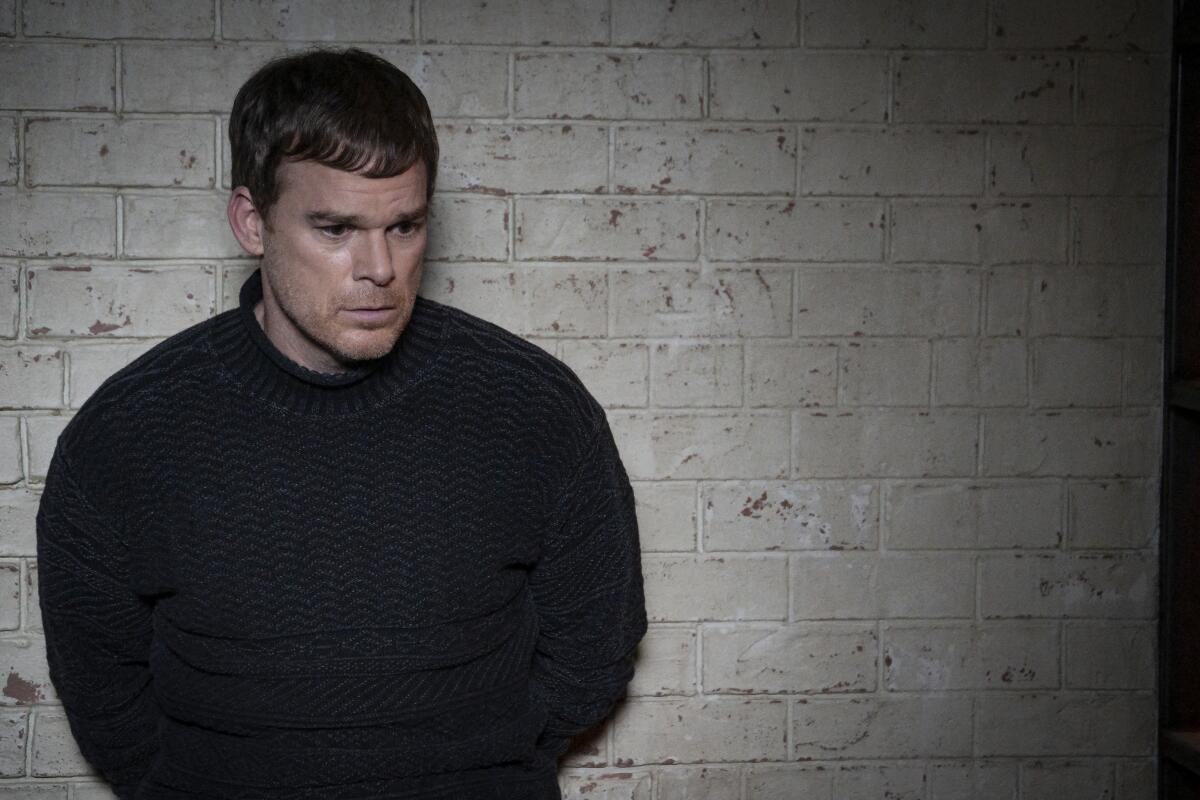
Clyde Phillips, who left the original series four years before its controversial finale, said he was grateful to Showtime for giving him the opportunity to revisit the series and provide a more appropriate conclusion to Morgan’s saga.
“I don’t know of any other show in the history of television that gets a do-over of a finale,” said Phillips, who developed the reboot and reprised his roles as executive producer and showrunner. “I think the audience is going to be surprised. Hardcore fans are going to be disappointed that he’s gone. But the smart hardcore fans are going to understand that this was inevitable.”
In the original conclusion of “Dexter,” Morgan took his foster sister Debra (Jennifer Carpenter) off life support after a blood clot caused her to suffer a stroke. He took her body out to open sea to dispose of it, then steered his vessel into an approaching hurricane in an apparent suicide attempt. However, he survived and wound up in a remote community far from Miami, where he started a new life as a lumberjack.
When “Dexter: New Blood” opens, Morgan has settled in his new life in Iron Lake, living under an alias — Jim Lindsay — and enjoying romantic bliss with Bishop. However, he is tormented by the ghost of Deb (Carpenter, reprising her role) and his dark tendencies are reawakened when Matt Caldwell (Steve M. Robertson), the arrogant son of the town’s unofficial mayor, Kurt Caldwell (Clancy Brown), comes to town.
Michael C. Hall’s back, plastic wrap in hand, in Showtime’s serial killer drama “Dexter: New Blood.”
His life is upended with the arrival of Harrison, who is angry and damaged after years spent in foster homes. Morgan is determined to become a true father and help his son heal. But those plans are derailed as Morgan resumes his murderous quest for justice.
Getting back into “Dexter mode” was easy for Hall: “The weirdest thing about it was how weird it didn’t feel to play him again. He was still very much alive and very much available.”
A key quality that endeared viewers to Morgan was his uncanny ability to get out of tight scrapes. And when Harrison discovers the truth about his father’s dark past, Morgan convinces him that his mission of killing criminals who had escaped punishment is noble.
But as evidence mounts and Bishop suspects that her boyfriend is hiding deadly secrets, Morgan realizes his options are running out and he becomes more reckless. He violates his code during an escape from jail, killing police Sgt. Logan (Alano Miller), who had formed a close bond with Harrison.
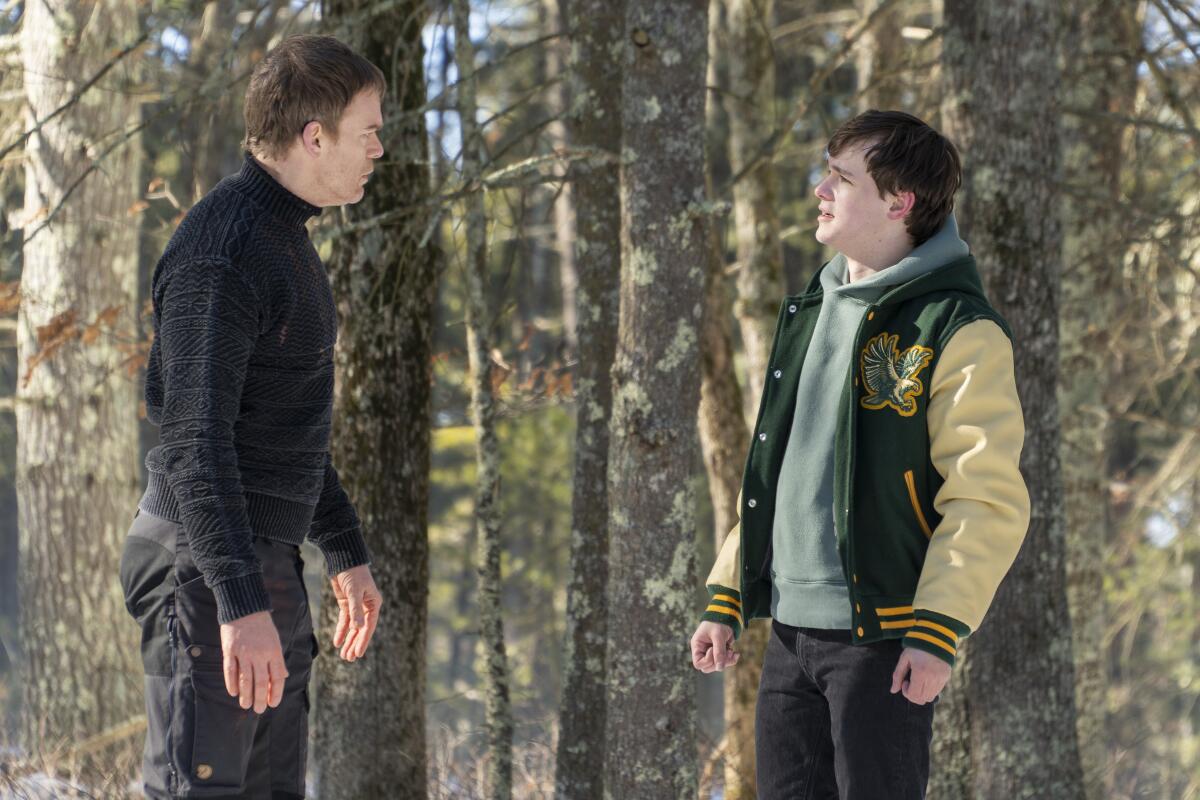
When the youth sees Logan’s blood on his father, Dexter realizes he is beyond redemption.
“Out of the desire not to get caught, Dexter kills someone that in no way fits the code,” Hall said. “And it’s someone that his son, who he loves above all others, revered. In that moment, Dexter apologizes to another human being for all he’s done to that person, and experiences a sense of connection to a person he’s never experienced before. It’s like, ‘I’m having a full experience of being a human being now, and could you please kill me because it’s unbearable.’”
In writing those climactic scenes, Phillips drew upon his own experience of “having a terrible father and needing years of therapy.” He also referred to a term in psychiatry that “the son has to ‘murder’ the father to proceed with life, to proceed with business, to proceed with love, to proceed with starting his own family. You can’t always have a father figure there holding you down. That was part of the impetus of having Harrison do the deed. Except here, he’s actually doing the deed. And make no mistake, this is fiction. We’re talking about sociopathic characters, and maybe psychopathic characters. Certainly Dexter is a psychopath.”
When Phillips pitched Hall on the reboot and its ending, the actor was intrigued. “The fact that the character was going to expire was a way for me to close the book on him in a way I haven’t been able to do,” Hall said. “I didn’t come to the table saying, ‘Dexter must meet his maker.’ But when that proposition was floated, I didn’t resist it.”
The filming of Morgan’s demise was not especially emotional or ceremonious for Hall for one simple reason: It took place during the first weeks of shooting.
“The events of the season take place over about two and a half weeks, but we shot in Massachusetts from February all the way into July,” he said. “So we shot all the stuff that was snow-dependent early. That scene came on the third week. It was really challenging to imagine everything we had left to film — it was strange to do it so early, and also strange to realize having completed that work that we had four to five more months to film.
“But in a way, it was liberating to know where we were headed as we filled in all the pieces.”
Although Morgan’s story has come to an end, Phillips, who was an executive producer and showrunner on “Nurse Jackie,” Showtime’s drama about a troubled emergency room nurse, said he is open to the possibility of developing a spinoff centering on Harrison, who was grappling with demons even before killing his father.
“If Showtime wanted to pursue that — I have a lot of stuff going on, but I would drop everything in a minute to do it,” Phillips said. “He’s so damaged. I write a lot of damaged people and I would love the opportunity to explore his psyche and put him in another world and to take this show and bring more people to it.”
When the finale airs for the first time, Hall will not be watching. He’s scheduled to perform at a concert honoring rock legend David Bowie, who would have been 75.
“Playing Dexter all these years was a kick,” he said. “It was an experience I’ve never had before and can’t imagine ever having again. But the desire for closure had to do with wanting to move on. Ever since the series proper ended, I would be asked periodically in interviews or on the street, ‘Are you going to do more “Dexter”? Please bring him back. What’s up with that ending? I hated the ending, I loved the show ... .’ This puts all those hypotheticals to bed.
“I’m not operating under the illusion that with the end of this show no one will think of me as Dexter any more. But this calms that noise.”
More to Read
The complete guide to home viewing
Get Screen Gab for everything about the TV shows and streaming movies everyone’s talking about.
You may occasionally receive promotional content from the Los Angeles Times.
